Impact of COVID-19 on UK's Economy and Government Responses
VerifiedAdded on 2023/06/13
|13
|4110
|412
AI Summary
This report analyzes the impact of COVID-19 on the UK's economy and measures taken by the government to overcome it. It covers the major economic responses of the UK's government and the Bank of England, including the Bounce Bank Loans scheme, Eat Out Help Out Scheme, Job Retention Scheme, and Self-Employment Income Support Scheme. The report also discusses the likely impacts of Brexit on the UK's economy.
Contribute Materials
Your contribution can guide someone’s learning journey. Share your
documents today.

Contemporary
Business Environment
Business Environment
Secure Best Marks with AI Grader
Need help grading? Try our AI Grader for instant feedback on your assignments.
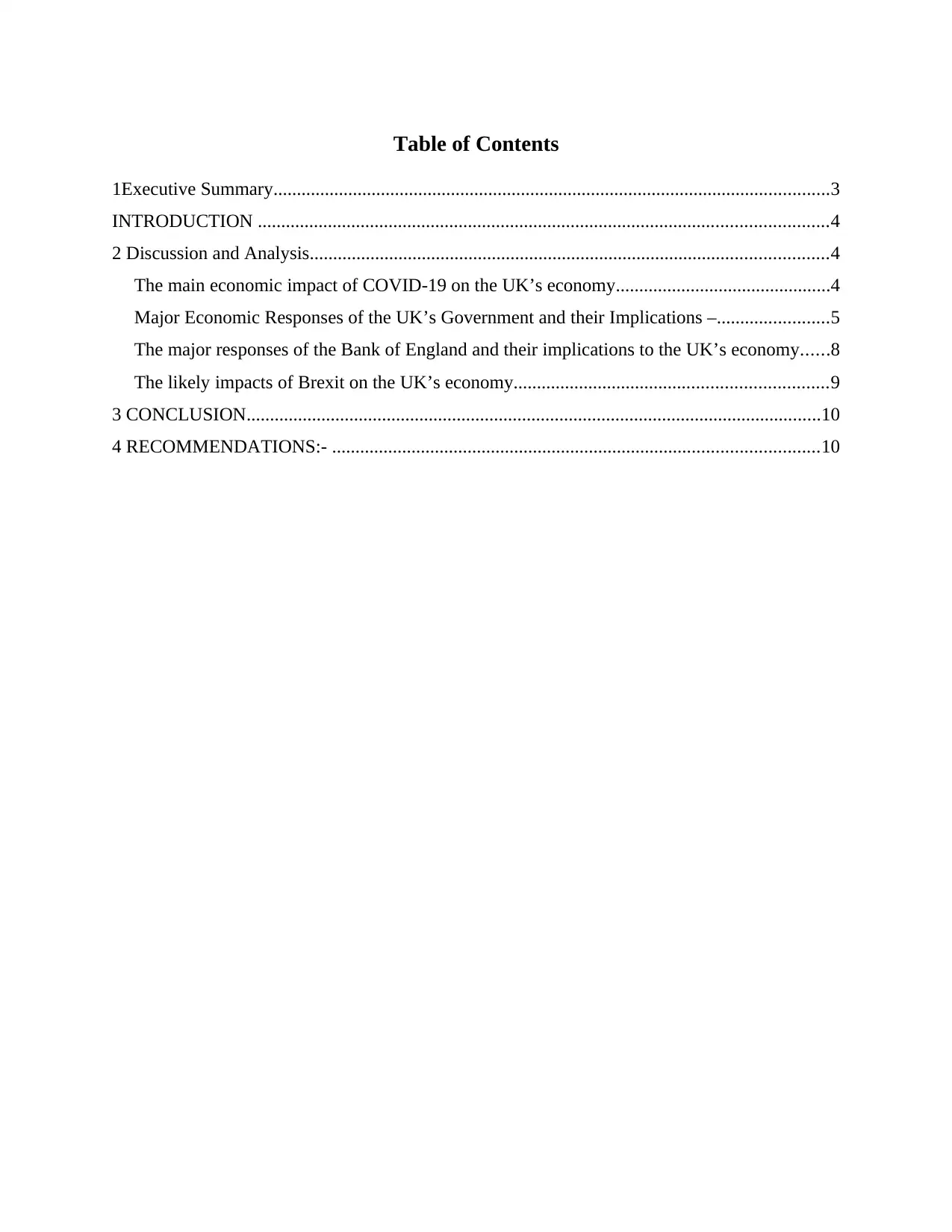
Table of Contents
1Executive Summary.......................................................................................................................3
INTRODUCTION ..........................................................................................................................4
2 Discussion and Analysis...............................................................................................................4
The main economic impact of COVID-19 on the UK’s economy..............................................4
Major Economic Responses of the UK’s Government and their Implications –........................5
The major responses of the Bank of England and their implications to the UK’s economy......8
The likely impacts of Brexit on the UK’s economy...................................................................9
3 CONCLUSION...........................................................................................................................10
4 RECOMMENDATIONS:- ........................................................................................................10
1Executive Summary.......................................................................................................................3
INTRODUCTION ..........................................................................................................................4
2 Discussion and Analysis...............................................................................................................4
The main economic impact of COVID-19 on the UK’s economy..............................................4
Major Economic Responses of the UK’s Government and their Implications –........................5
The major responses of the Bank of England and their implications to the UK’s economy......8
The likely impacts of Brexit on the UK’s economy...................................................................9
3 CONCLUSION...........................................................................................................................10
4 RECOMMENDATIONS:- ........................................................................................................10
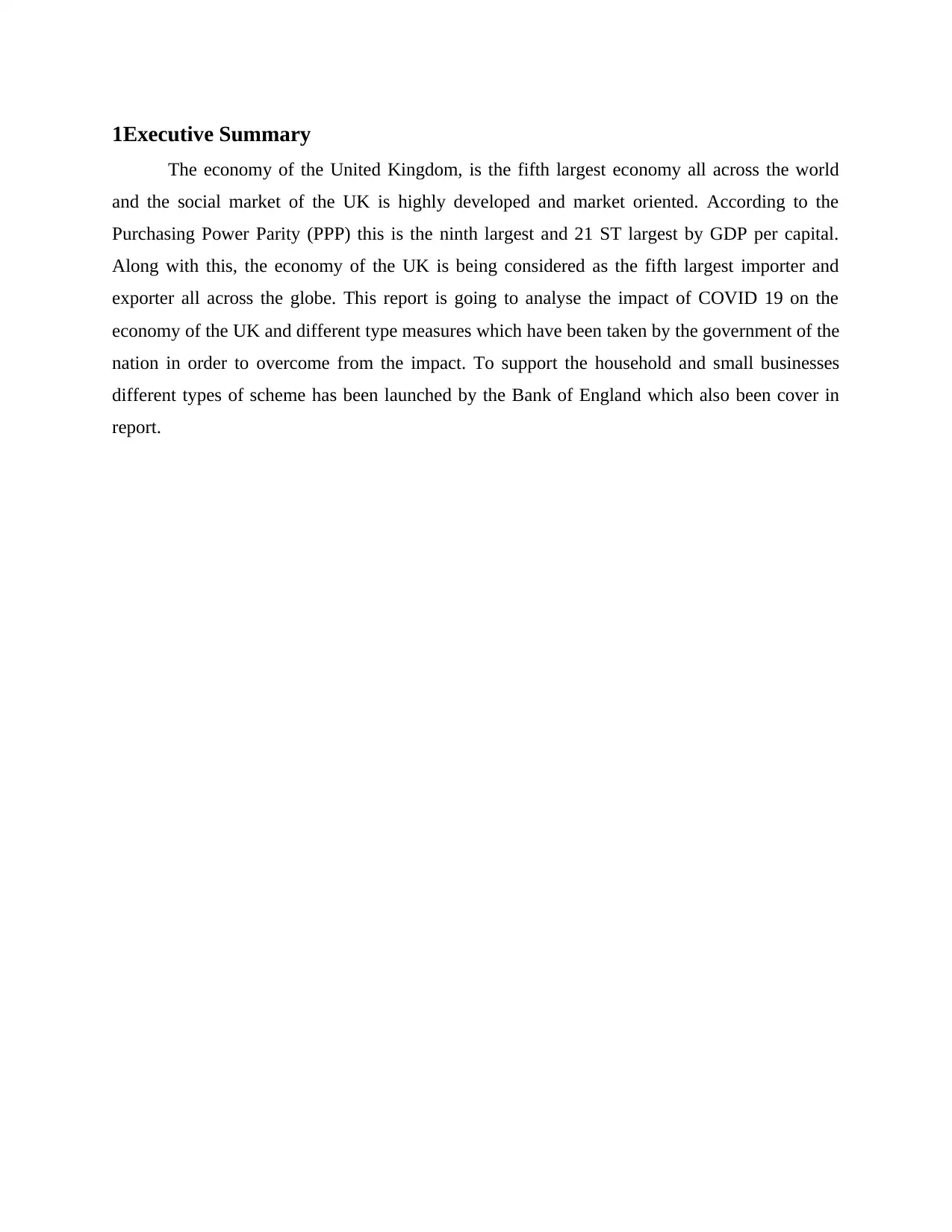
1Executive Summary
The economy of the United Kingdom, is the fifth largest economy all across the world
and the social market of the UK is highly developed and market oriented. According to the
Purchasing Power Parity (PPP) this is the ninth largest and 21 ST largest by GDP per capital.
Along with this, the economy of the UK is being considered as the fifth largest importer and
exporter all across the globe. This report is going to analyse the impact of COVID 19 on the
economy of the UK and different type measures which have been taken by the government of the
nation in order to overcome from the impact. To support the household and small businesses
different types of scheme has been launched by the Bank of England which also been cover in
report.
The economy of the United Kingdom, is the fifth largest economy all across the world
and the social market of the UK is highly developed and market oriented. According to the
Purchasing Power Parity (PPP) this is the ninth largest and 21 ST largest by GDP per capital.
Along with this, the economy of the UK is being considered as the fifth largest importer and
exporter all across the globe. This report is going to analyse the impact of COVID 19 on the
economy of the UK and different type measures which have been taken by the government of the
nation in order to overcome from the impact. To support the household and small businesses
different types of scheme has been launched by the Bank of England which also been cover in
report.
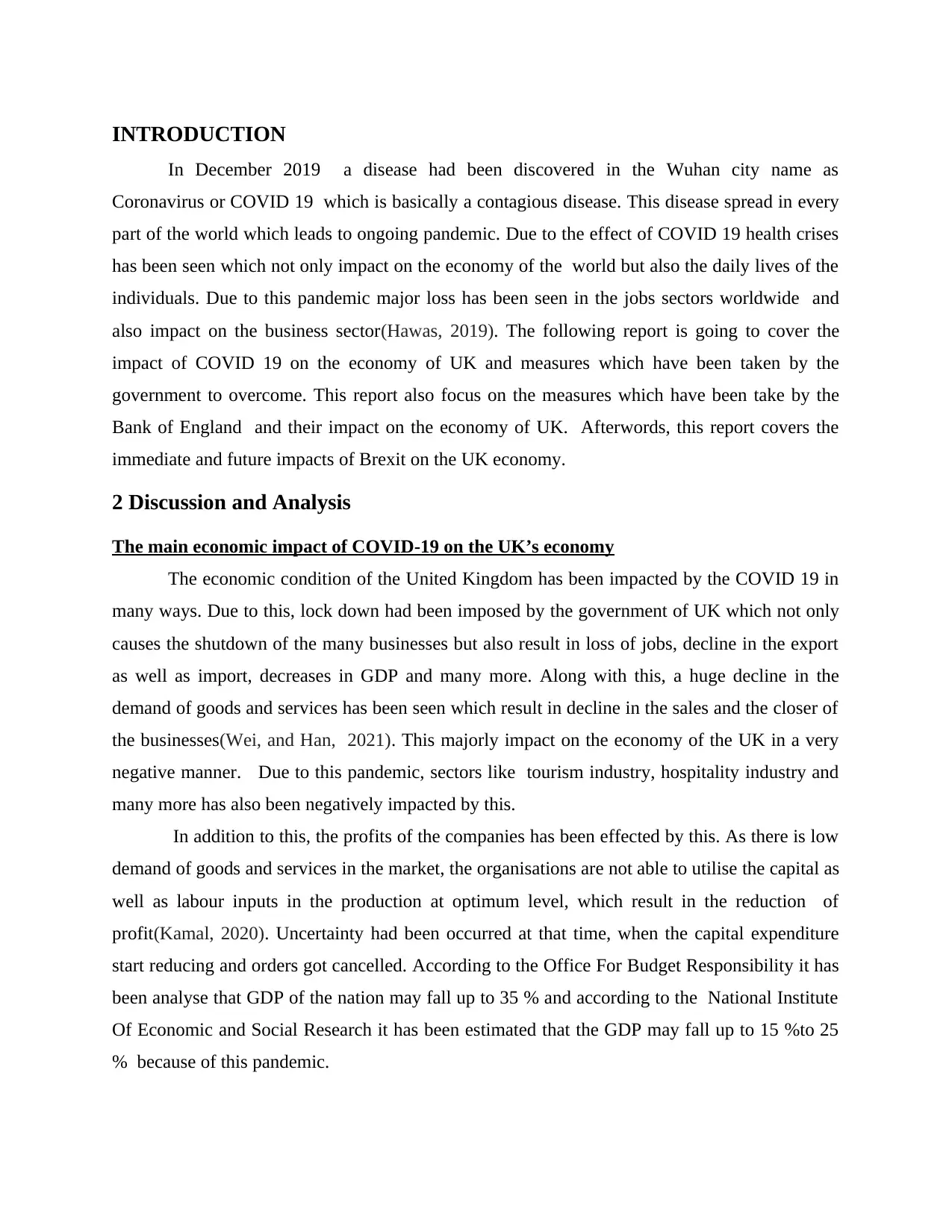
INTRODUCTION
In December 2019 a disease had been discovered in the Wuhan city name as
Coronavirus or COVID 19 which is basically a contagious disease. This disease spread in every
part of the world which leads to ongoing pandemic. Due to the effect of COVID 19 health crises
has been seen which not only impact on the economy of the world but also the daily lives of the
individuals. Due to this pandemic major loss has been seen in the jobs sectors worldwide and
also impact on the business sector(Hawas, 2019). The following report is going to cover the
impact of COVID 19 on the economy of UK and measures which have been taken by the
government to overcome. This report also focus on the measures which have been take by the
Bank of England and their impact on the economy of UK. Afterwords, this report covers the
immediate and future impacts of Brexit on the UK economy.
2 Discussion and Analysis
The main economic impact of COVID-19 on the UK’s economy
The economic condition of the United Kingdom has been impacted by the COVID 19 in
many ways. Due to this, lock down had been imposed by the government of UK which not only
causes the shutdown of the many businesses but also result in loss of jobs, decline in the export
as well as import, decreases in GDP and many more. Along with this, a huge decline in the
demand of goods and services has been seen which result in decline in the sales and the closer of
the businesses(Wei, and Han, 2021). This majorly impact on the economy of the UK in a very
negative manner. Due to this pandemic, sectors like tourism industry, hospitality industry and
many more has also been negatively impacted by this.
In addition to this, the profits of the companies has been effected by this. As there is low
demand of goods and services in the market, the organisations are not able to utilise the capital as
well as labour inputs in the production at optimum level, which result in the reduction of
profit(Kamal, 2020). Uncertainty had been occurred at that time, when the capital expenditure
start reducing and orders got cancelled. According to the Office For Budget Responsibility it has
been analyse that GDP of the nation may fall up to 35 % and according to the National Institute
Of Economic and Social Research it has been estimated that the GDP may fall up to 15 %to 25
% because of this pandemic.
In December 2019 a disease had been discovered in the Wuhan city name as
Coronavirus or COVID 19 which is basically a contagious disease. This disease spread in every
part of the world which leads to ongoing pandemic. Due to the effect of COVID 19 health crises
has been seen which not only impact on the economy of the world but also the daily lives of the
individuals. Due to this pandemic major loss has been seen in the jobs sectors worldwide and
also impact on the business sector(Hawas, 2019). The following report is going to cover the
impact of COVID 19 on the economy of UK and measures which have been taken by the
government to overcome. This report also focus on the measures which have been take by the
Bank of England and their impact on the economy of UK. Afterwords, this report covers the
immediate and future impacts of Brexit on the UK economy.
2 Discussion and Analysis
The main economic impact of COVID-19 on the UK’s economy
The economic condition of the United Kingdom has been impacted by the COVID 19 in
many ways. Due to this, lock down had been imposed by the government of UK which not only
causes the shutdown of the many businesses but also result in loss of jobs, decline in the export
as well as import, decreases in GDP and many more. Along with this, a huge decline in the
demand of goods and services has been seen which result in decline in the sales and the closer of
the businesses(Wei, and Han, 2021). This majorly impact on the economy of the UK in a very
negative manner. Due to this pandemic, sectors like tourism industry, hospitality industry and
many more has also been negatively impacted by this.
In addition to this, the profits of the companies has been effected by this. As there is low
demand of goods and services in the market, the organisations are not able to utilise the capital as
well as labour inputs in the production at optimum level, which result in the reduction of
profit(Kamal, 2020). Uncertainty had been occurred at that time, when the capital expenditure
start reducing and orders got cancelled. According to the Office For Budget Responsibility it has
been analyse that GDP of the nation may fall up to 35 % and according to the National Institute
Of Economic and Social Research it has been estimated that the GDP may fall up to 15 %to 25
% because of this pandemic.
Secure Best Marks with AI Grader
Need help grading? Try our AI Grader for instant feedback on your assignments.
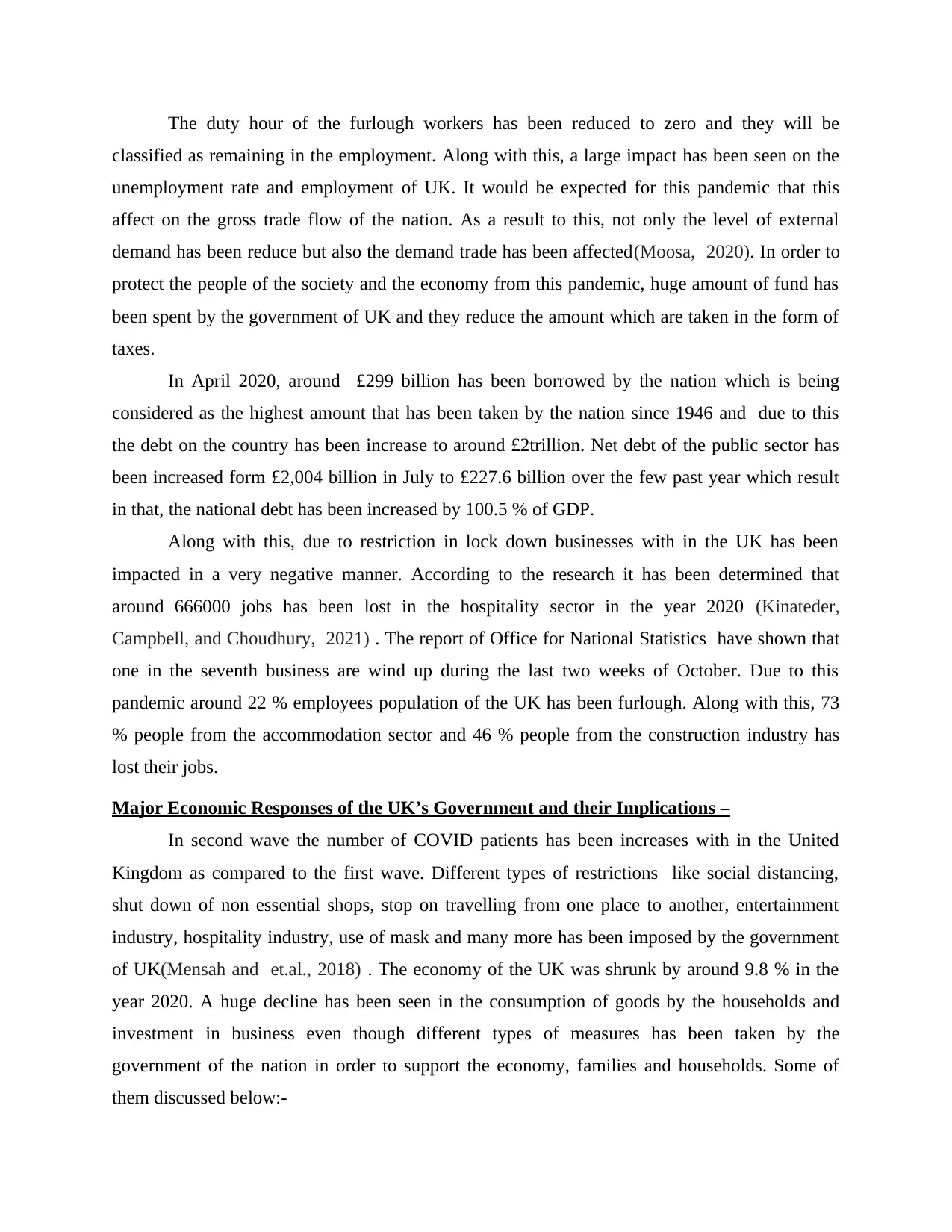
The duty hour of the furlough workers has been reduced to zero and they will be
classified as remaining in the employment. Along with this, a large impact has been seen on the
unemployment rate and employment of UK. It would be expected for this pandemic that this
affect on the gross trade flow of the nation. As a result to this, not only the level of external
demand has been reduce but also the demand trade has been affected(Moosa, 2020). In order to
protect the people of the society and the economy from this pandemic, huge amount of fund has
been spent by the government of UK and they reduce the amount which are taken in the form of
taxes.
In April 2020, around £299 billion has been borrowed by the nation which is being
considered as the highest amount that has been taken by the nation since 1946 and due to this
the debt on the country has been increase to around £2trillion. Net debt of the public sector has
been increased form £2,004 billion in July to £227.6 billion over the few past year which result
in that, the national debt has been increased by 100.5 % of GDP.
Along with this, due to restriction in lock down businesses with in the UK has been
impacted in a very negative manner. According to the research it has been determined that
around 666000 jobs has been lost in the hospitality sector in the year 2020 (Kinateder,
Campbell, and Choudhury, 2021) . The report of Office for National Statistics have shown that
one in the seventh business are wind up during the last two weeks of October. Due to this
pandemic around 22 % employees population of the UK has been furlough. Along with this, 73
% people from the accommodation sector and 46 % people from the construction industry has
lost their jobs.
Major Economic Responses of the UK’s Government and their Implications –
In second wave the number of COVID patients has been increases with in the United
Kingdom as compared to the first wave. Different types of restrictions like social distancing,
shut down of non essential shops, stop on travelling from one place to another, entertainment
industry, hospitality industry, use of mask and many more has been imposed by the government
of UK(Mensah and et.al., 2018) . The economy of the UK was shrunk by around 9.8 % in the
year 2020. A huge decline has been seen in the consumption of goods by the households and
investment in business even though different types of measures has been taken by the
government of the nation in order to support the economy, families and households. Some of
them discussed below:-
classified as remaining in the employment. Along with this, a large impact has been seen on the
unemployment rate and employment of UK. It would be expected for this pandemic that this
affect on the gross trade flow of the nation. As a result to this, not only the level of external
demand has been reduce but also the demand trade has been affected(Moosa, 2020). In order to
protect the people of the society and the economy from this pandemic, huge amount of fund has
been spent by the government of UK and they reduce the amount which are taken in the form of
taxes.
In April 2020, around £299 billion has been borrowed by the nation which is being
considered as the highest amount that has been taken by the nation since 1946 and due to this
the debt on the country has been increase to around £2trillion. Net debt of the public sector has
been increased form £2,004 billion in July to £227.6 billion over the few past year which result
in that, the national debt has been increased by 100.5 % of GDP.
Along with this, due to restriction in lock down businesses with in the UK has been
impacted in a very negative manner. According to the research it has been determined that
around 666000 jobs has been lost in the hospitality sector in the year 2020 (Kinateder,
Campbell, and Choudhury, 2021) . The report of Office for National Statistics have shown that
one in the seventh business are wind up during the last two weeks of October. Due to this
pandemic around 22 % employees population of the UK has been furlough. Along with this, 73
% people from the accommodation sector and 46 % people from the construction industry has
lost their jobs.
Major Economic Responses of the UK’s Government and their Implications –
In second wave the number of COVID patients has been increases with in the United
Kingdom as compared to the first wave. Different types of restrictions like social distancing,
shut down of non essential shops, stop on travelling from one place to another, entertainment
industry, hospitality industry, use of mask and many more has been imposed by the government
of UK(Mensah and et.al., 2018) . The economy of the UK was shrunk by around 9.8 % in the
year 2020. A huge decline has been seen in the consumption of goods by the households and
investment in business even though different types of measures has been taken by the
government of the nation in order to support the economy, families and households. Some of
them discussed below:-
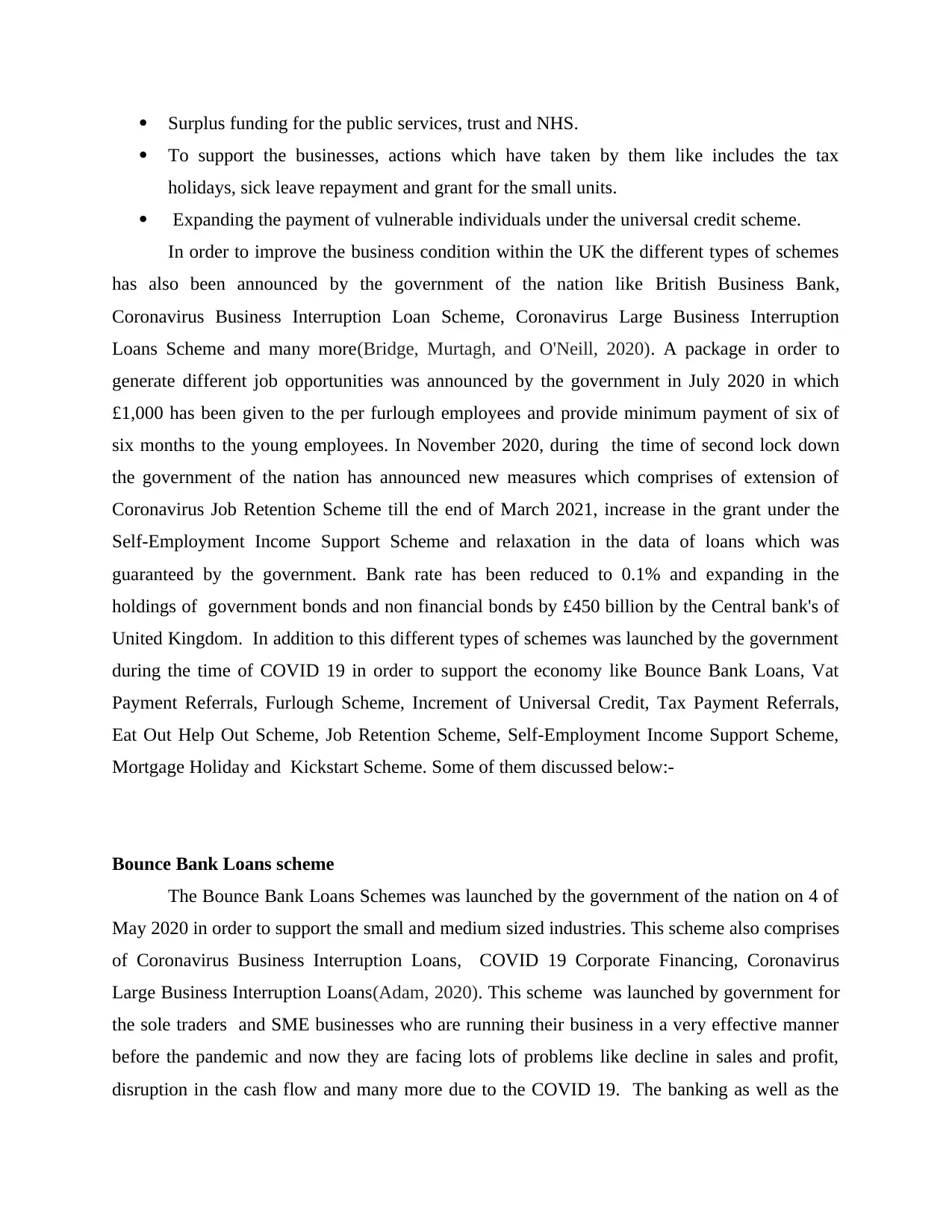
Surplus funding for the public services, trust and NHS.
To support the businesses, actions which have taken by them like includes the tax
holidays, sick leave repayment and grant for the small units.
Expanding the payment of vulnerable individuals under the universal credit scheme.
In order to improve the business condition within the UK the different types of schemes
has also been announced by the government of the nation like British Business Bank,
Coronavirus Business Interruption Loan Scheme, Coronavirus Large Business Interruption
Loans Scheme and many more(Bridge, Murtagh, and O'Neill, 2020). A package in order to
generate different job opportunities was announced by the government in July 2020 in which
£1,000 has been given to the per furlough employees and provide minimum payment of six of
six months to the young employees. In November 2020, during the time of second lock down
the government of the nation has announced new measures which comprises of extension of
Coronavirus Job Retention Scheme till the end of March 2021, increase in the grant under the
Self-Employment Income Support Scheme and relaxation in the data of loans which was
guaranteed by the government. Bank rate has been reduced to 0.1% and expanding in the
holdings of government bonds and non financial bonds by £450 billion by the Central bank's of
United Kingdom. In addition to this different types of schemes was launched by the government
during the time of COVID 19 in order to support the economy like Bounce Bank Loans, Vat
Payment Referrals, Furlough Scheme, Increment of Universal Credit, Tax Payment Referrals,
Eat Out Help Out Scheme, Job Retention Scheme, Self-Employment Income Support Scheme,
Mortgage Holiday and Kickstart Scheme. Some of them discussed below:-
Bounce Bank Loans scheme
The Bounce Bank Loans Schemes was launched by the government of the nation on 4 of
May 2020 in order to support the small and medium sized industries. This scheme also comprises
of Coronavirus Business Interruption Loans, COVID 19 Corporate Financing, Coronavirus
Large Business Interruption Loans(Adam, 2020). This scheme was launched by government for
the sole traders and SME businesses who are running their business in a very effective manner
before the pandemic and now they are facing lots of problems like decline in sales and profit,
disruption in the cash flow and many more due to the COVID 19. The banking as well as the
To support the businesses, actions which have taken by them like includes the tax
holidays, sick leave repayment and grant for the small units.
Expanding the payment of vulnerable individuals under the universal credit scheme.
In order to improve the business condition within the UK the different types of schemes
has also been announced by the government of the nation like British Business Bank,
Coronavirus Business Interruption Loan Scheme, Coronavirus Large Business Interruption
Loans Scheme and many more(Bridge, Murtagh, and O'Neill, 2020). A package in order to
generate different job opportunities was announced by the government in July 2020 in which
£1,000 has been given to the per furlough employees and provide minimum payment of six of
six months to the young employees. In November 2020, during the time of second lock down
the government of the nation has announced new measures which comprises of extension of
Coronavirus Job Retention Scheme till the end of March 2021, increase in the grant under the
Self-Employment Income Support Scheme and relaxation in the data of loans which was
guaranteed by the government. Bank rate has been reduced to 0.1% and expanding in the
holdings of government bonds and non financial bonds by £450 billion by the Central bank's of
United Kingdom. In addition to this different types of schemes was launched by the government
during the time of COVID 19 in order to support the economy like Bounce Bank Loans, Vat
Payment Referrals, Furlough Scheme, Increment of Universal Credit, Tax Payment Referrals,
Eat Out Help Out Scheme, Job Retention Scheme, Self-Employment Income Support Scheme,
Mortgage Holiday and Kickstart Scheme. Some of them discussed below:-
Bounce Bank Loans scheme
The Bounce Bank Loans Schemes was launched by the government of the nation on 4 of
May 2020 in order to support the small and medium sized industries. This scheme also comprises
of Coronavirus Business Interruption Loans, COVID 19 Corporate Financing, Coronavirus
Large Business Interruption Loans(Adam, 2020). This scheme was launched by government for
the sole traders and SME businesses who are running their business in a very effective manner
before the pandemic and now they are facing lots of problems like decline in sales and profit,
disruption in the cash flow and many more due to the COVID 19. The banking as well as the
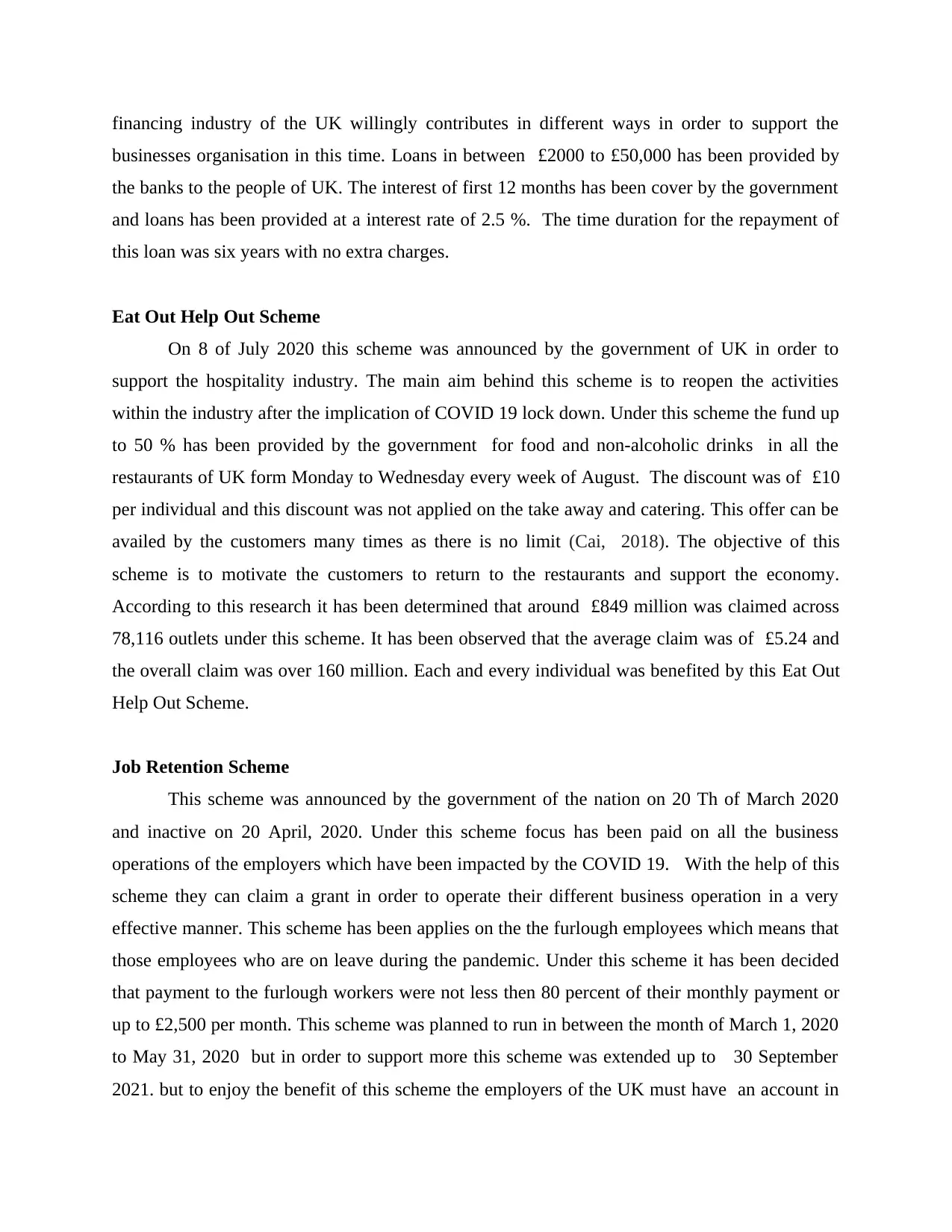
financing industry of the UK willingly contributes in different ways in order to support the
businesses organisation in this time. Loans in between £2000 to £50,000 has been provided by
the banks to the people of UK. The interest of first 12 months has been cover by the government
and loans has been provided at a interest rate of 2.5 %. The time duration for the repayment of
this loan was six years with no extra charges.
Eat Out Help Out Scheme
On 8 of July 2020 this scheme was announced by the government of UK in order to
support the hospitality industry. The main aim behind this scheme is to reopen the activities
within the industry after the implication of COVID 19 lock down. Under this scheme the fund up
to 50 % has been provided by the government for food and non-alcoholic drinks in all the
restaurants of UK form Monday to Wednesday every week of August. The discount was of £10
per individual and this discount was not applied on the take away and catering. This offer can be
availed by the customers many times as there is no limit (Cai, 2018). The objective of this
scheme is to motivate the customers to return to the restaurants and support the economy.
According to this research it has been determined that around £849 million was claimed across
78,116 outlets under this scheme. It has been observed that the average claim was of £5.24 and
the overall claim was over 160 million. Each and every individual was benefited by this Eat Out
Help Out Scheme.
Job Retention Scheme
This scheme was announced by the government of the nation on 20 Th of March 2020
and inactive on 20 April, 2020. Under this scheme focus has been paid on all the business
operations of the employers which have been impacted by the COVID 19. With the help of this
scheme they can claim a grant in order to operate their different business operation in a very
effective manner. This scheme has been applies on the the furlough employees which means that
those employees who are on leave during the pandemic. Under this scheme it has been decided
that payment to the furlough workers were not less then 80 percent of their monthly payment or
up to £2,500 per month. This scheme was planned to run in between the month of March 1, 2020
to May 31, 2020 but in order to support more this scheme was extended up to 30 September
2021. but to enjoy the benefit of this scheme the employers of the UK must have an account in
businesses organisation in this time. Loans in between £2000 to £50,000 has been provided by
the banks to the people of UK. The interest of first 12 months has been cover by the government
and loans has been provided at a interest rate of 2.5 %. The time duration for the repayment of
this loan was six years with no extra charges.
Eat Out Help Out Scheme
On 8 of July 2020 this scheme was announced by the government of UK in order to
support the hospitality industry. The main aim behind this scheme is to reopen the activities
within the industry after the implication of COVID 19 lock down. Under this scheme the fund up
to 50 % has been provided by the government for food and non-alcoholic drinks in all the
restaurants of UK form Monday to Wednesday every week of August. The discount was of £10
per individual and this discount was not applied on the take away and catering. This offer can be
availed by the customers many times as there is no limit (Cai, 2018). The objective of this
scheme is to motivate the customers to return to the restaurants and support the economy.
According to this research it has been determined that around £849 million was claimed across
78,116 outlets under this scheme. It has been observed that the average claim was of £5.24 and
the overall claim was over 160 million. Each and every individual was benefited by this Eat Out
Help Out Scheme.
Job Retention Scheme
This scheme was announced by the government of the nation on 20 Th of March 2020
and inactive on 20 April, 2020. Under this scheme focus has been paid on all the business
operations of the employers which have been impacted by the COVID 19. With the help of this
scheme they can claim a grant in order to operate their different business operation in a very
effective manner. This scheme has been applies on the the furlough employees which means that
those employees who are on leave during the pandemic. Under this scheme it has been decided
that payment to the furlough workers were not less then 80 percent of their monthly payment or
up to £2,500 per month. This scheme was planned to run in between the month of March 1, 2020
to May 31, 2020 but in order to support more this scheme was extended up to 30 September
2021. but to enjoy the benefit of this scheme the employers of the UK must have an account in
Paraphrase This Document
Need a fresh take? Get an instant paraphrase of this document with our AI Paraphraser
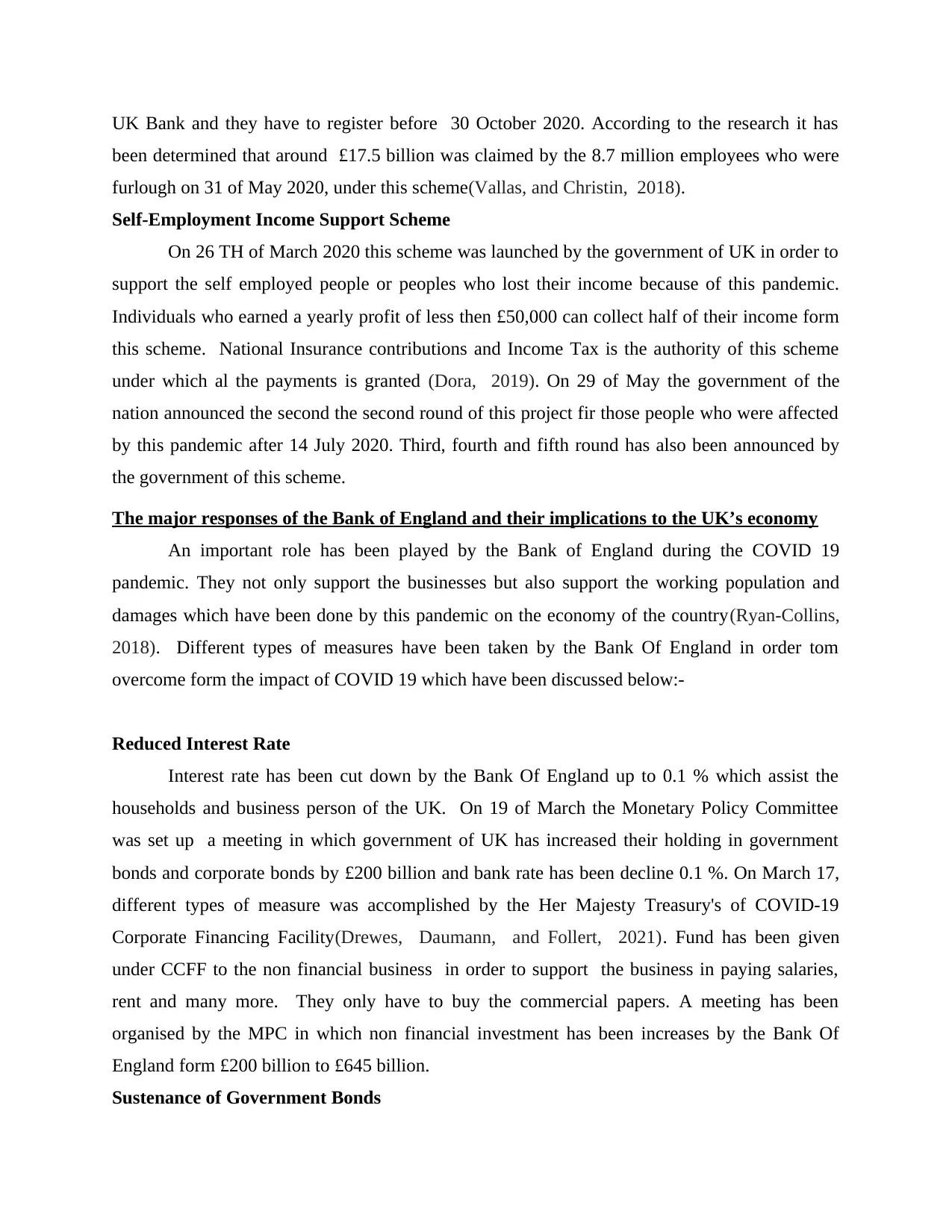
UK Bank and they have to register before 30 October 2020. According to the research it has
been determined that around £17.5 billion was claimed by the 8.7 million employees who were
furlough on 31 of May 2020, under this scheme(Vallas, and Christin, 2018).
Self-Employment Income Support Scheme
On 26 TH of March 2020 this scheme was launched by the government of UK in order to
support the self employed people or peoples who lost their income because of this pandemic.
Individuals who earned a yearly profit of less then £50,000 can collect half of their income form
this scheme. National Insurance contributions and Income Tax is the authority of this scheme
under which al the payments is granted (Dora, 2019). On 29 of May the government of the
nation announced the second the second round of this project fir those people who were affected
by this pandemic after 14 July 2020. Third, fourth and fifth round has also been announced by
the government of this scheme.
The major responses of the Bank of England and their implications to the UK’s economy
An important role has been played by the Bank of England during the COVID 19
pandemic. They not only support the businesses but also support the working population and
damages which have been done by this pandemic on the economy of the country(Ryan-Collins,
2018). Different types of measures have been taken by the Bank Of England in order tom
overcome form the impact of COVID 19 which have been discussed below:-
Reduced Interest Rate
Interest rate has been cut down by the Bank Of England up to 0.1 % which assist the
households and business person of the UK. On 19 of March the Monetary Policy Committee
was set up a meeting in which government of UK has increased their holding in government
bonds and corporate bonds by £200 billion and bank rate has been decline 0.1 %. On March 17,
different types of measure was accomplished by the Her Majesty Treasury's of COVID-19
Corporate Financing Facility(Drewes, Daumann, and Follert, 2021). Fund has been given
under CCFF to the non financial business in order to support the business in paying salaries,
rent and many more. They only have to buy the commercial papers. A meeting has been
organised by the MPC in which non financial investment has been increases by the Bank Of
England form £200 billion to £645 billion.
Sustenance of Government Bonds
been determined that around £17.5 billion was claimed by the 8.7 million employees who were
furlough on 31 of May 2020, under this scheme(Vallas, and Christin, 2018).
Self-Employment Income Support Scheme
On 26 TH of March 2020 this scheme was launched by the government of UK in order to
support the self employed people or peoples who lost their income because of this pandemic.
Individuals who earned a yearly profit of less then £50,000 can collect half of their income form
this scheme. National Insurance contributions and Income Tax is the authority of this scheme
under which al the payments is granted (Dora, 2019). On 29 of May the government of the
nation announced the second the second round of this project fir those people who were affected
by this pandemic after 14 July 2020. Third, fourth and fifth round has also been announced by
the government of this scheme.
The major responses of the Bank of England and their implications to the UK’s economy
An important role has been played by the Bank of England during the COVID 19
pandemic. They not only support the businesses but also support the working population and
damages which have been done by this pandemic on the economy of the country(Ryan-Collins,
2018). Different types of measures have been taken by the Bank Of England in order tom
overcome form the impact of COVID 19 which have been discussed below:-
Reduced Interest Rate
Interest rate has been cut down by the Bank Of England up to 0.1 % which assist the
households and business person of the UK. On 19 of March the Monetary Policy Committee
was set up a meeting in which government of UK has increased their holding in government
bonds and corporate bonds by £200 billion and bank rate has been decline 0.1 %. On March 17,
different types of measure was accomplished by the Her Majesty Treasury's of COVID-19
Corporate Financing Facility(Drewes, Daumann, and Follert, 2021). Fund has been given
under CCFF to the non financial business in order to support the business in paying salaries,
rent and many more. They only have to buy the commercial papers. A meeting has been
organised by the MPC in which non financial investment has been increases by the Bank Of
England form £200 billion to £645 billion.
Sustenance of Government Bonds
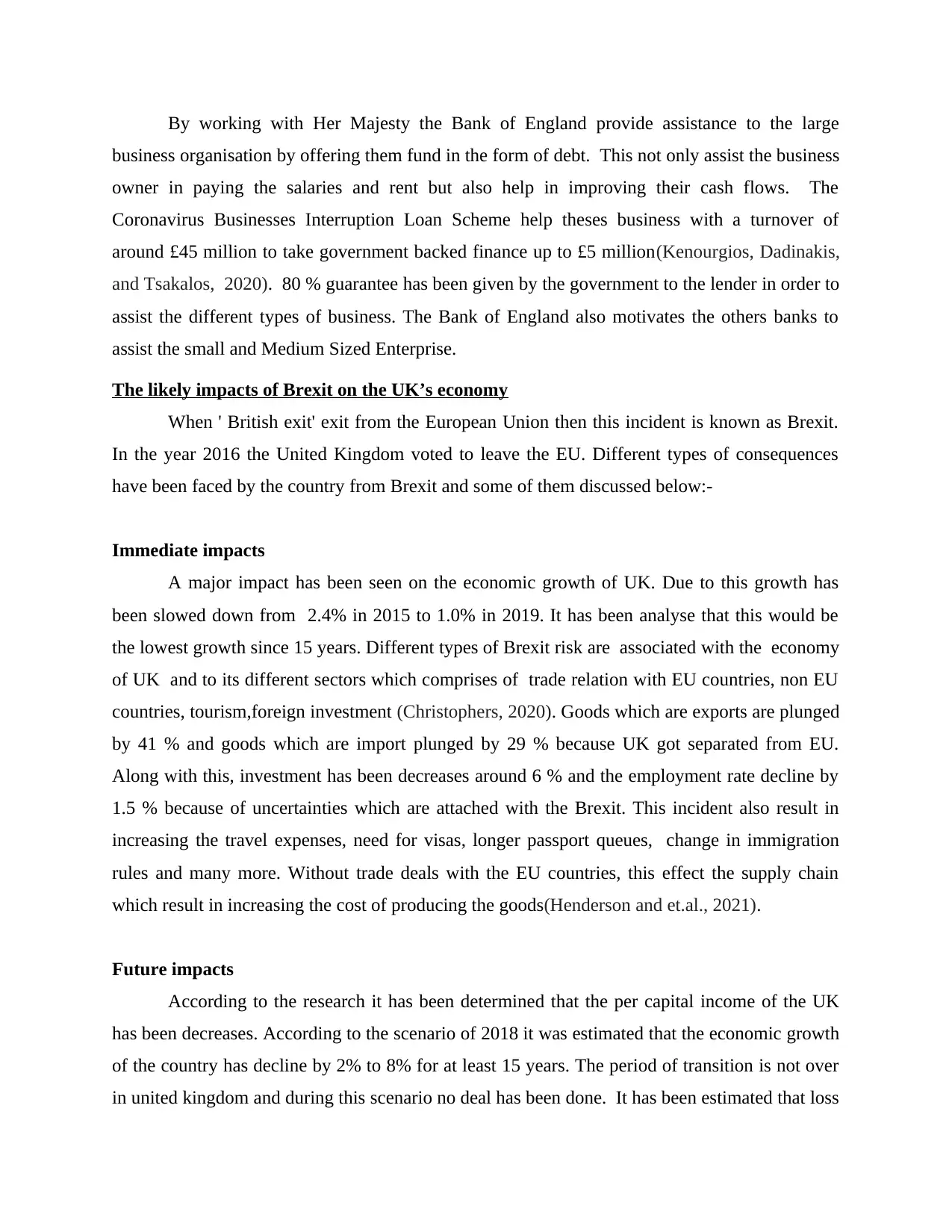
By working with Her Majesty the Bank of England provide assistance to the large
business organisation by offering them fund in the form of debt. This not only assist the business
owner in paying the salaries and rent but also help in improving their cash flows. The
Coronavirus Businesses Interruption Loan Scheme help theses business with a turnover of
around £45 million to take government backed finance up to £5 million(Kenourgios, Dadinakis,
and Tsakalos, 2020). 80 % guarantee has been given by the government to the lender in order to
assist the different types of business. The Bank of England also motivates the others banks to
assist the small and Medium Sized Enterprise.
The likely impacts of Brexit on the UK’s economy
When ' British exit' exit from the European Union then this incident is known as Brexit.
In the year 2016 the United Kingdom voted to leave the EU. Different types of consequences
have been faced by the country from Brexit and some of them discussed below:-
Immediate impacts
A major impact has been seen on the economic growth of UK. Due to this growth has
been slowed down from 2.4% in 2015 to 1.0% in 2019. It has been analyse that this would be
the lowest growth since 15 years. Different types of Brexit risk are associated with the economy
of UK and to its different sectors which comprises of trade relation with EU countries, non EU
countries, tourism,foreign investment (Christophers, 2020). Goods which are exports are plunged
by 41 % and goods which are import plunged by 29 % because UK got separated from EU.
Along with this, investment has been decreases around 6 % and the employment rate decline by
1.5 % because of uncertainties which are attached with the Brexit. This incident also result in
increasing the travel expenses, need for visas, longer passport queues, change in immigration
rules and many more. Without trade deals with the EU countries, this effect the supply chain
which result in increasing the cost of producing the goods(Henderson and et.al., 2021).
Future impacts
According to the research it has been determined that the per capital income of the UK
has been decreases. According to the scenario of 2018 it was estimated that the economic growth
of the country has decline by 2% to 8% for at least 15 years. The period of transition is not over
in united kingdom and during this scenario no deal has been done. It has been estimated that loss
business organisation by offering them fund in the form of debt. This not only assist the business
owner in paying the salaries and rent but also help in improving their cash flows. The
Coronavirus Businesses Interruption Loan Scheme help theses business with a turnover of
around £45 million to take government backed finance up to £5 million(Kenourgios, Dadinakis,
and Tsakalos, 2020). 80 % guarantee has been given by the government to the lender in order to
assist the different types of business. The Bank of England also motivates the others banks to
assist the small and Medium Sized Enterprise.
The likely impacts of Brexit on the UK’s economy
When ' British exit' exit from the European Union then this incident is known as Brexit.
In the year 2016 the United Kingdom voted to leave the EU. Different types of consequences
have been faced by the country from Brexit and some of them discussed below:-
Immediate impacts
A major impact has been seen on the economic growth of UK. Due to this growth has
been slowed down from 2.4% in 2015 to 1.0% in 2019. It has been analyse that this would be
the lowest growth since 15 years. Different types of Brexit risk are associated with the economy
of UK and to its different sectors which comprises of trade relation with EU countries, non EU
countries, tourism,foreign investment (Christophers, 2020). Goods which are exports are plunged
by 41 % and goods which are import plunged by 29 % because UK got separated from EU.
Along with this, investment has been decreases around 6 % and the employment rate decline by
1.5 % because of uncertainties which are attached with the Brexit. This incident also result in
increasing the travel expenses, need for visas, longer passport queues, change in immigration
rules and many more. Without trade deals with the EU countries, this effect the supply chain
which result in increasing the cost of producing the goods(Henderson and et.al., 2021).
Future impacts
According to the research it has been determined that the per capital income of the UK
has been decreases. According to the scenario of 2018 it was estimated that the economic growth
of the country has decline by 2% to 8% for at least 15 years. The period of transition is not over
in united kingdom and during this scenario no deal has been done. It has been estimated that loss
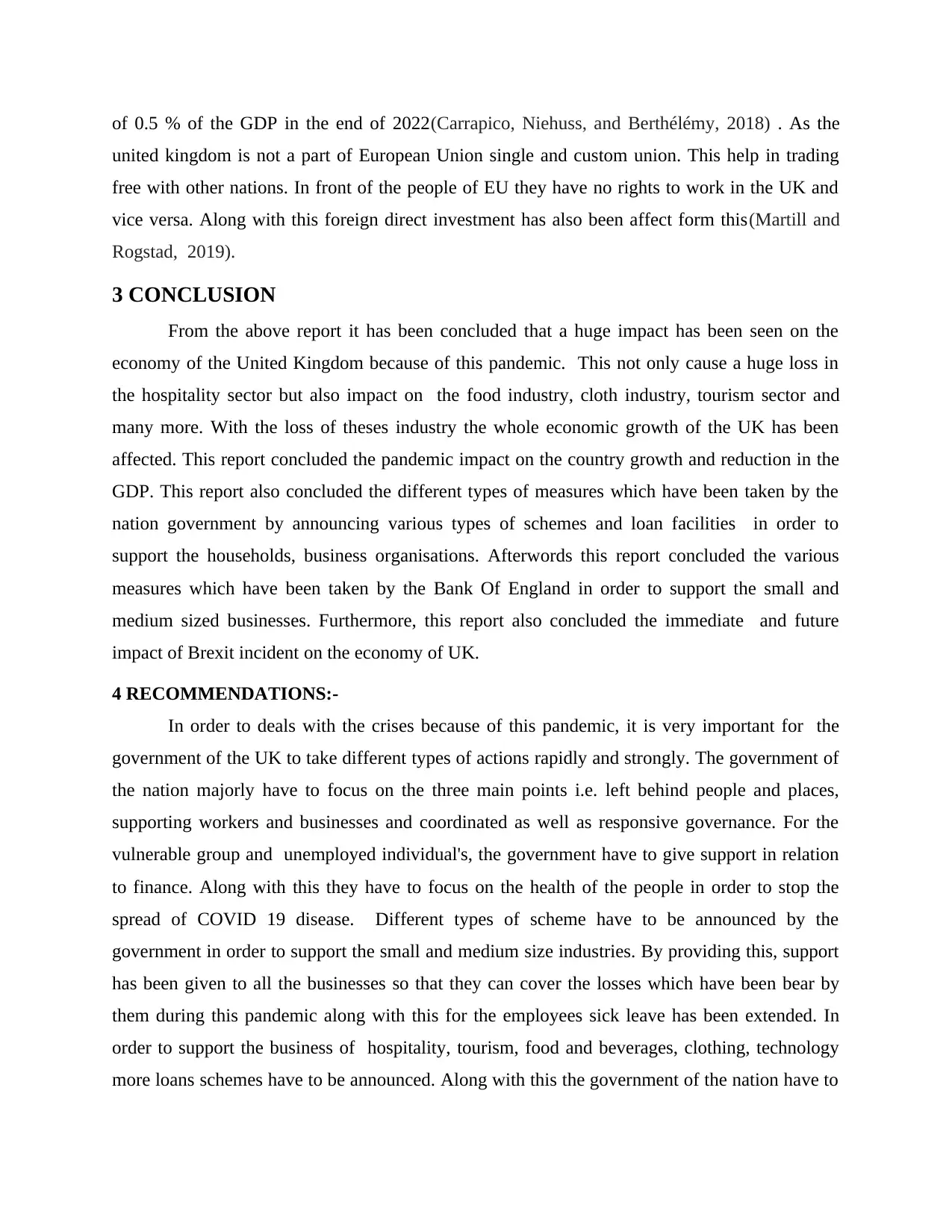
of 0.5 % of the GDP in the end of 2022(Carrapico, Niehuss, and Berthélémy, 2018) . As the
united kingdom is not a part of European Union single and custom union. This help in trading
free with other nations. In front of the people of EU they have no rights to work in the UK and
vice versa. Along with this foreign direct investment has also been affect form this(Martill and
Rogstad, 2019).
3 CONCLUSION
From the above report it has been concluded that a huge impact has been seen on the
economy of the United Kingdom because of this pandemic. This not only cause a huge loss in
the hospitality sector but also impact on the food industry, cloth industry, tourism sector and
many more. With the loss of theses industry the whole economic growth of the UK has been
affected. This report concluded the pandemic impact on the country growth and reduction in the
GDP. This report also concluded the different types of measures which have been taken by the
nation government by announcing various types of schemes and loan facilities in order to
support the households, business organisations. Afterwords this report concluded the various
measures which have been taken by the Bank Of England in order to support the small and
medium sized businesses. Furthermore, this report also concluded the immediate and future
impact of Brexit incident on the economy of UK.
4 RECOMMENDATIONS:-
In order to deals with the crises because of this pandemic, it is very important for the
government of the UK to take different types of actions rapidly and strongly. The government of
the nation majorly have to focus on the three main points i.e. left behind people and places,
supporting workers and businesses and coordinated as well as responsive governance. For the
vulnerable group and unemployed individual's, the government have to give support in relation
to finance. Along with this they have to focus on the health of the people in order to stop the
spread of COVID 19 disease. Different types of scheme have to be announced by the
government in order to support the small and medium size industries. By providing this, support
has been given to all the businesses so that they can cover the losses which have been bear by
them during this pandemic along with this for the employees sick leave has been extended. In
order to support the business of hospitality, tourism, food and beverages, clothing, technology
more loans schemes have to be announced. Along with this the government of the nation have to
united kingdom is not a part of European Union single and custom union. This help in trading
free with other nations. In front of the people of EU they have no rights to work in the UK and
vice versa. Along with this foreign direct investment has also been affect form this(Martill and
Rogstad, 2019).
3 CONCLUSION
From the above report it has been concluded that a huge impact has been seen on the
economy of the United Kingdom because of this pandemic. This not only cause a huge loss in
the hospitality sector but also impact on the food industry, cloth industry, tourism sector and
many more. With the loss of theses industry the whole economic growth of the UK has been
affected. This report concluded the pandemic impact on the country growth and reduction in the
GDP. This report also concluded the different types of measures which have been taken by the
nation government by announcing various types of schemes and loan facilities in order to
support the households, business organisations. Afterwords this report concluded the various
measures which have been taken by the Bank Of England in order to support the small and
medium sized businesses. Furthermore, this report also concluded the immediate and future
impact of Brexit incident on the economy of UK.
4 RECOMMENDATIONS:-
In order to deals with the crises because of this pandemic, it is very important for the
government of the UK to take different types of actions rapidly and strongly. The government of
the nation majorly have to focus on the three main points i.e. left behind people and places,
supporting workers and businesses and coordinated as well as responsive governance. For the
vulnerable group and unemployed individual's, the government have to give support in relation
to finance. Along with this they have to focus on the health of the people in order to stop the
spread of COVID 19 disease. Different types of scheme have to be announced by the
government in order to support the small and medium size industries. By providing this, support
has been given to all the businesses so that they can cover the losses which have been bear by
them during this pandemic along with this for the employees sick leave has been extended. In
order to support the business of hospitality, tourism, food and beverages, clothing, technology
more loans schemes have to be announced. Along with this the government of the nation have to
Secure Best Marks with AI Grader
Need help grading? Try our AI Grader for instant feedback on your assignments.

provide awareness about the impact of COVID and the precautions which have to be taken by
them.
them.
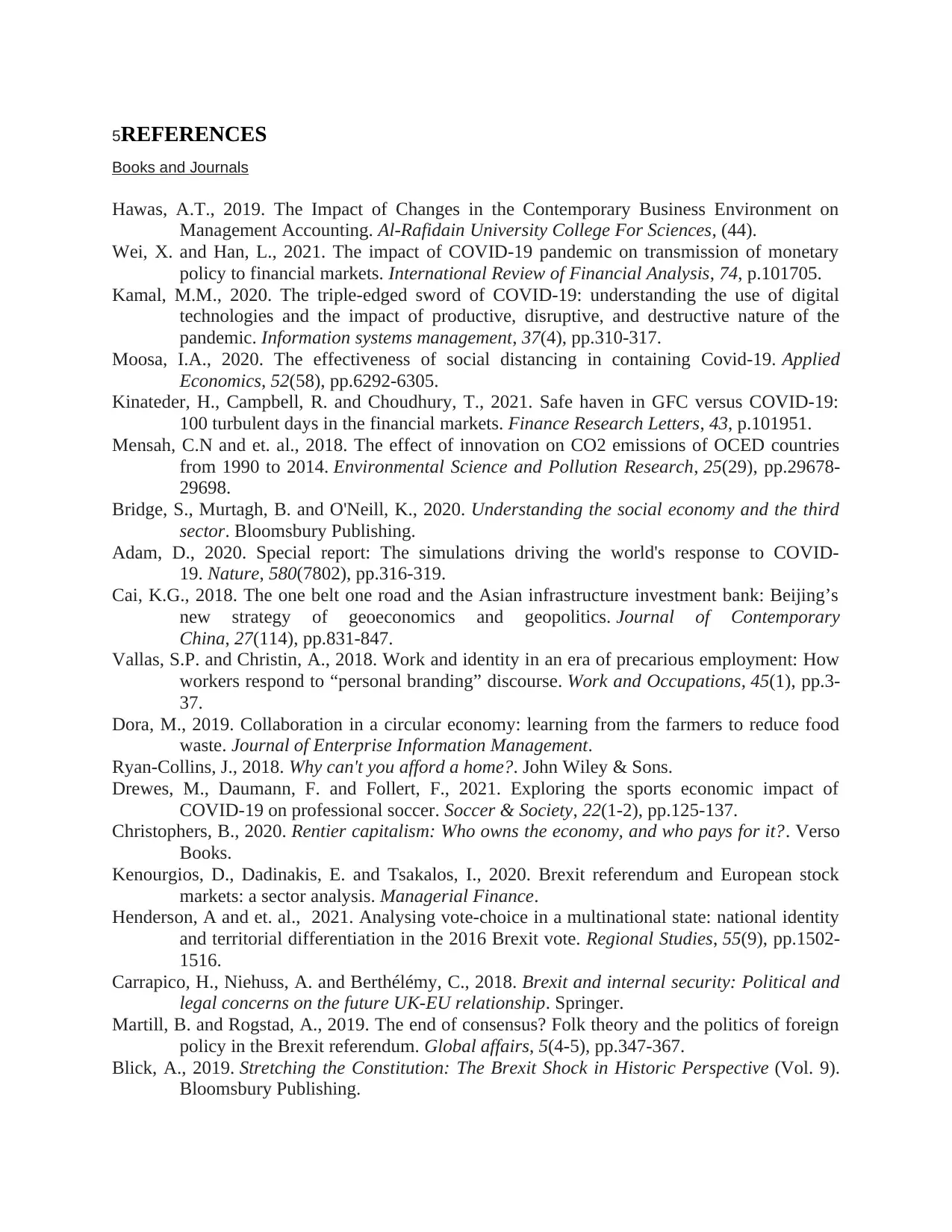
5REFERENCES
Books and Journals
Hawas, A.T., 2019. The Impact of Changes in the Contemporary Business Environment on
Management Accounting. Al-Rafidain University College For Sciences, (44).
Wei, X. and Han, L., 2021. The impact of COVID-19 pandemic on transmission of monetary
policy to financial markets. International Review of Financial Analysis, 74, p.101705.
Kamal, M.M., 2020. The triple-edged sword of COVID-19: understanding the use of digital
technologies and the impact of productive, disruptive, and destructive nature of the
pandemic. Information systems management, 37(4), pp.310-317.
Moosa, I.A., 2020. The effectiveness of social distancing in containing Covid-19. Applied
Economics, 52(58), pp.6292-6305.
Kinateder, H., Campbell, R. and Choudhury, T., 2021. Safe haven in GFC versus COVID-19:
100 turbulent days in the financial markets. Finance Research Letters, 43, p.101951.
Mensah, C.N and et. al., 2018. The effect of innovation on CO2 emissions of OCED countries
from 1990 to 2014. Environmental Science and Pollution Research, 25(29), pp.29678-
29698.
Bridge, S., Murtagh, B. and O'Neill, K., 2020. Understanding the social economy and the third
sector. Bloomsbury Publishing.
Adam, D., 2020. Special report: The simulations driving the world's response to COVID-
19. Nature, 580(7802), pp.316-319.
Cai, K.G., 2018. The one belt one road and the Asian infrastructure investment bank: Beijing’s
new strategy of geoeconomics and geopolitics. Journal of Contemporary
China, 27(114), pp.831-847.
Vallas, S.P. and Christin, A., 2018. Work and identity in an era of precarious employment: How
workers respond to “personal branding” discourse. Work and Occupations, 45(1), pp.3-
37.
Dora, M., 2019. Collaboration in a circular economy: learning from the farmers to reduce food
waste. Journal of Enterprise Information Management.
Ryan-Collins, J., 2018. Why can't you afford a home?. John Wiley & Sons.
Drewes, M., Daumann, F. and Follert, F., 2021. Exploring the sports economic impact of
COVID-19 on professional soccer. Soccer & Society, 22(1-2), pp.125-137.
Christophers, B., 2020. Rentier capitalism: Who owns the economy, and who pays for it?. Verso
Books.
Kenourgios, D., Dadinakis, E. and Tsakalos, I., 2020. Brexit referendum and European stock
markets: a sector analysis. Managerial Finance.
Henderson, A and et. al., 2021. Analysing vote-choice in a multinational state: national identity
and territorial differentiation in the 2016 Brexit vote. Regional Studies, 55(9), pp.1502-
1516.
Carrapico, H., Niehuss, A. and Berthélémy, C., 2018. Brexit and internal security: Political and
legal concerns on the future UK-EU relationship. Springer.
Martill, B. and Rogstad, A., 2019. The end of consensus? Folk theory and the politics of foreign
policy in the Brexit referendum. Global affairs, 5(4-5), pp.347-367.
Blick, A., 2019. Stretching the Constitution: The Brexit Shock in Historic Perspective (Vol. 9).
Bloomsbury Publishing.
Books and Journals
Hawas, A.T., 2019. The Impact of Changes in the Contemporary Business Environment on
Management Accounting. Al-Rafidain University College For Sciences, (44).
Wei, X. and Han, L., 2021. The impact of COVID-19 pandemic on transmission of monetary
policy to financial markets. International Review of Financial Analysis, 74, p.101705.
Kamal, M.M., 2020. The triple-edged sword of COVID-19: understanding the use of digital
technologies and the impact of productive, disruptive, and destructive nature of the
pandemic. Information systems management, 37(4), pp.310-317.
Moosa, I.A., 2020. The effectiveness of social distancing in containing Covid-19. Applied
Economics, 52(58), pp.6292-6305.
Kinateder, H., Campbell, R. and Choudhury, T., 2021. Safe haven in GFC versus COVID-19:
100 turbulent days in the financial markets. Finance Research Letters, 43, p.101951.
Mensah, C.N and et. al., 2018. The effect of innovation on CO2 emissions of OCED countries
from 1990 to 2014. Environmental Science and Pollution Research, 25(29), pp.29678-
29698.
Bridge, S., Murtagh, B. and O'Neill, K., 2020. Understanding the social economy and the third
sector. Bloomsbury Publishing.
Adam, D., 2020. Special report: The simulations driving the world's response to COVID-
19. Nature, 580(7802), pp.316-319.
Cai, K.G., 2018. The one belt one road and the Asian infrastructure investment bank: Beijing’s
new strategy of geoeconomics and geopolitics. Journal of Contemporary
China, 27(114), pp.831-847.
Vallas, S.P. and Christin, A., 2018. Work and identity in an era of precarious employment: How
workers respond to “personal branding” discourse. Work and Occupations, 45(1), pp.3-
37.
Dora, M., 2019. Collaboration in a circular economy: learning from the farmers to reduce food
waste. Journal of Enterprise Information Management.
Ryan-Collins, J., 2018. Why can't you afford a home?. John Wiley & Sons.
Drewes, M., Daumann, F. and Follert, F., 2021. Exploring the sports economic impact of
COVID-19 on professional soccer. Soccer & Society, 22(1-2), pp.125-137.
Christophers, B., 2020. Rentier capitalism: Who owns the economy, and who pays for it?. Verso
Books.
Kenourgios, D., Dadinakis, E. and Tsakalos, I., 2020. Brexit referendum and European stock
markets: a sector analysis. Managerial Finance.
Henderson, A and et. al., 2021. Analysing vote-choice in a multinational state: national identity
and territorial differentiation in the 2016 Brexit vote. Regional Studies, 55(9), pp.1502-
1516.
Carrapico, H., Niehuss, A. and Berthélémy, C., 2018. Brexit and internal security: Political and
legal concerns on the future UK-EU relationship. Springer.
Martill, B. and Rogstad, A., 2019. The end of consensus? Folk theory and the politics of foreign
policy in the Brexit referendum. Global affairs, 5(4-5), pp.347-367.
Blick, A., 2019. Stretching the Constitution: The Brexit Shock in Historic Perspective (Vol. 9).
Bloomsbury Publishing.

1 out of 13
Related Documents
Your All-in-One AI-Powered Toolkit for Academic Success.
+13062052269
info@desklib.com
Available 24*7 on WhatsApp / Email
![[object Object]](/_next/static/media/star-bottom.7253800d.svg)
Unlock your academic potential
© 2024 | Zucol Services PVT LTD | All rights reserved.



